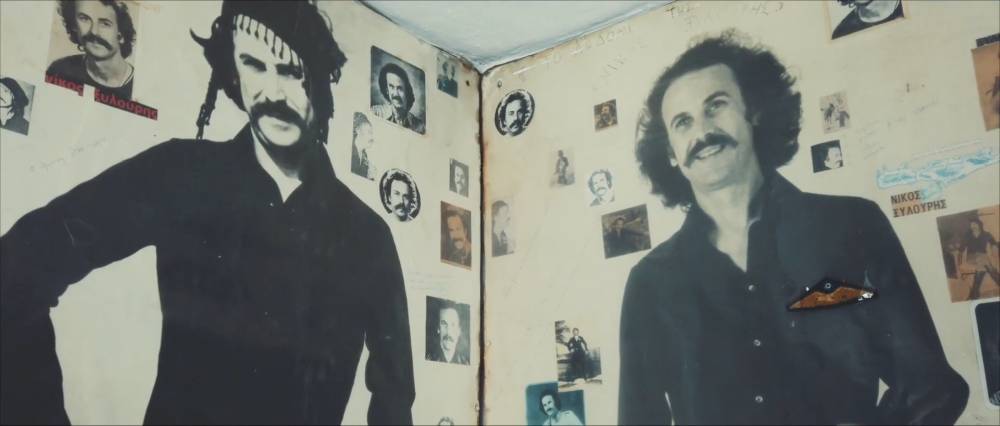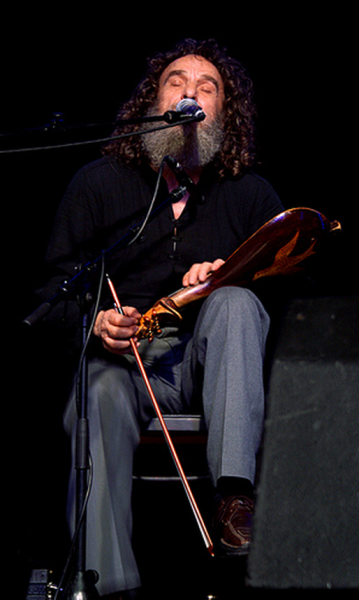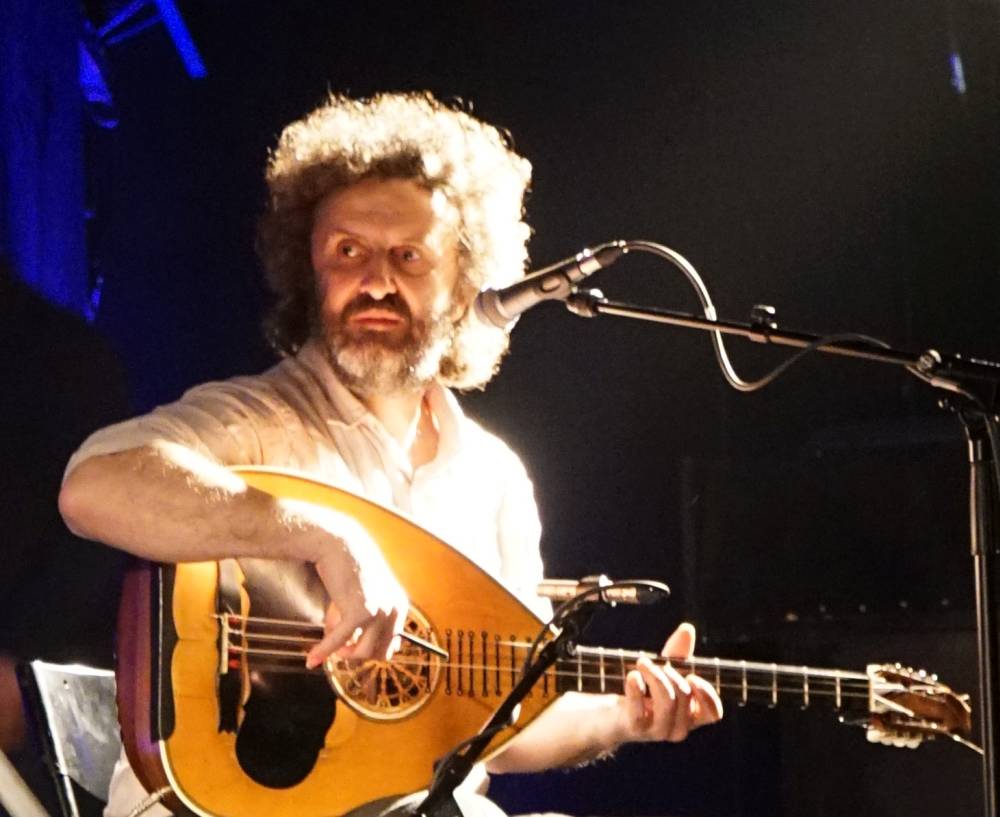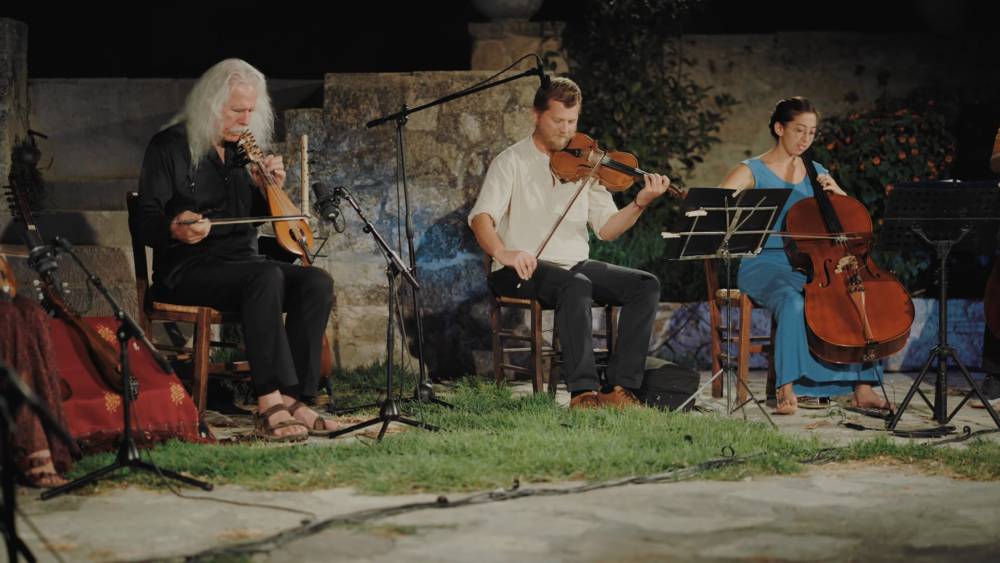The music of Crete owes its power not only to its traditional forms but to the brilliance of its musicians. These artists have breathed life into the island’s songs, blending tradition with innovation and carrying its melodies across borders.
Nikos Xylouris: The Archangel of Crete
Known as the “Archangel of Crete,” Nikos Xylouris was a legendary Cretan singer, composer, and lyra player whose music became a symbol of freedom and resistance. Born in 1936 in the mountain village of Anogeia, Crete, Xylouris was deeply shaped by the island’s rich musical heritage and tumultuous history, including the destruction of his village by the Nazis during World War II. From an early age, he showed an extraordinary gift for music, convincing his initially reluctant father to buy him a Cretan lyra. Under the tutelage of master lyra player Leonidas Klados, Xylouris honed his craft and began performing at local festivals and celebrations (Klados, a self-taught virtuoso, first gained recognition for his remarkable talent during Crete’s wartime resistance)
Xylouris’ music bridged the divide between rural traditions and urban orchestral innovation, gaining widespread popularity across Greece. His powerful, haunting voice and ability to bring ancient Cretan rizitika songs to life resonated with audiences, especially during the Greek military junta (1967–1974), when his music became a voice of resistance. Songs like “Anyfantou” and his work on the theatrical production To Megalo Mas Tsirko (Our Great Circus) solidified his role as a cultural icon.

Xylouris collaborated with renowned Greek composers like Yannis Markopoulos and Stavros Xarchakos, performing poetry by greats such as Yannis Ritsos and Giorgos Seferis. His contributions to music earned him international recognition, including the Grand Prix du Disque in 1971. Despite his untimely death in 1980 from cancer, his legacy endures, and his music continues to inspire and define Cretan identity. Explore his work on his YouTube Topic channel.
Psarantonis: The Primal Voice of Crete
A living legend of Cretan music, Psarantonis is known for his deeply experimental approach to traditional sounds, as well as the raw emotional power of his voice and playing style. Born in 1937 in the mountainous village of Anogeia, Crete, he is the younger brother of the famed Nikos Xylouris and part of the illustrious Xylouris musical dynasty. Psarantonis’ connection to Cretan tradition is unparalleled, and his music is marked by a profound understanding of Crete’s history, mythology, and nature.

Psarantonis first picked up the Cretan lyra at age 13 and released his first recording in 1964, “I Thought of Denying You.” Over the decades, he has become known for his ability to infuse Cretan folk music with a raw, almost primal energy. His lyra playing style is unconventional and expressive, transforming the instrument into a vehicle for storytelling and deep emotion. In addition to the lyra, Psarantonis plays various traditional instruments and has a unique vocal timbre that resonates with the soul of Crete
He has represented Greece in numerous international festivals, including performances at All Tomorrow’s Parties in the UK and Australia, curated by Nick Cave & The Bad Seeds. Psarantonis has collaborated with artists such as Daemonia Nymphe and Vinicio Capossela, blending traditional music with global influences. He is also the father of Giorgos Xylouris, who continues the family’s musical legacy. Explore Psarantonis’ groundbreaking work on his YouTube Topic channel.
Giorgos Xylouris (Psarogiorgis): Tradition Meets Innovation
A master of the laouto and a leading figure in contemporary Cretan music, Giorgos Xylouris, also known as Psarogiorgis, was born in 1965 in Anogeia, Crete, into the renowned Xylouris musical family. Guided by his father, the legendary Psarantonis, Giorgos began playing the mandolin before mastering the laouto, which became his primary instrument. From the age of 11, he accompanied his father at festivals, concerts, and social events, gaining early exposure to both traditional Cretan music and its evolving forms.
In the 1990s, Giorgos lived in Melbourne, Australia, where he formed the Xylouris Ensemble. The group’s fusion of traditional Cretan music with diverse influences led to five acclaimed albums and extensive tours across Australia and Europe. Returning to Crete in 1997, Giorgos continued to innovate, collaborating with artists such as Ross Daly, Giannis Aggelakas, and Stelios Petrakis.
Since 2013, Giorgos has partnered with Australian drummer Jim White in the acclaimed project Xylouris White. Their genre-defying sound blends Cretan music with rock and improvisational elements, earning praise for albums like Goats and The Forest in Me.

Beyond his collaborations, Giorgos has contributed to film soundtracks and recently began work on his first solo album. His music, rooted in tradition but unafraid to explore new horizons, remains a testament to his innovative spirit and deep connection to Crete’s musical heritage. Explore his unique artistry through his recordings and live performances worldwide.
Kostas Mountakis: The Keeper of Tradition
Widely regarded as one of the most influential figures in Cretan music, Kostas Mountakis (Greek: Κώστας Μουντάκης, a.k.a. Μουντόκωστας, 1926–1991) played a pivotal role in popularizing the Cretan lyra and shaping the island’s musical tradition. Born in the village of Alfa in Mylopotamos, Crete, Mountakis grew up in a family deeply rooted in the region’s musical heritage. His older brother, Nikistratos, and the renowned musician Mitsos Kaffatos, who became his mentor, sparked his early interest in music. By the age of 15, during the turbulent years of the German occupation of Crete, Mountakis was already captivating audiences with his lyra and voice, performing at village gatherings and wedding celebrations.
In 1952, Mountakis made his first significant recording appearance, accompanying Stelios Koutsourelis, and by 1954, he released his own groundbreaking recordings, including timeless classics like “De Thelo Stin Kardia” and “Erotokritos.” His music blended traditional melodies with a unique personal style, earning him widespread acclaim and inspiring countless musicians to follow in his footsteps.
Mountakis’ contributions to the Cretan lyra extended beyond performance. He developed teaching methods that ensured the survival and continued evolution of the instrument. His dedication to preserving and advancing the island’s musical traditions helped bring Cretan music to a global audience, cementing his legacy as a master and innovator.
Today, Kostas Mountakis is remembered not only as a virtuoso lyra player but also as a cultural ambassador who bridged Cretan tradition with the modern world. Explore his music on his YouTube Topic channel.
Ross Daly: The Global Ambassador of Modal Music
A true pioneer of Contemporary Modal Music, Ross Daly has spent his life bridging musical traditions from across the globe. Born in 1952 in King’s Lynn, Norfolk, England, Daly’s journey led him to Crete, where he fell in love with the Cretan lyra and made the island his home for over 35 years. His deep understanding of modal music traditions—spanning the Middle East, Central Asia, and the Indian subcontinent—shaped his unique approach to music, blending these influences with Cretan folk traditions to create new and innovative compositions.

In 1982, Daly founded the Labyrinth Musical Workshop in Houdetsi, Crete, a cultural and educational institution dedicated to exploring and teaching traditional modal music. The workshop has become a global hub for musicians, hosting masterclasses with world-renowned artists and displaying more than 250 rare instruments Daly collected during his travels.
Daly has also made significant contributions to the evolution of the Cretan lyra, designing a version with 18 (later 22) sympathetic strings that resonate in the style of Indian instruments like the sarangi. His compositions, spanning over 35 albums, reflect his philosophy that tradition is not static but a timeless continuum connecting past, present, and future.
As an artistic director, he organized the 2004 Heraklion cultural program for the Olympics, bringing together musicians from across the world. Daly’s music transcends boundaries, blending traditions to create a universal dialogue. Discover his groundbreaking work on his YouTube Topic channel.
The Instruments Behind the Music
Cretan music owes much of its power to its iconic instruments, crafted by skilled artisans and handed down through generations:
- The Lyra: Central to Cretan music, this three-stringed, pear-shaped instrument produces the melancholic melodies that define the island’s sound.
- The Laouto: Often used as rhythmic accompaniment, this lute has become a defining feature of modern compositions.
- The Boulgari: A tamboura-like instrument once popular in Crete, now less common but deeply tied to its musical history.
To experience the craftsmanship behind these instruments, visit workshops in Rethymno or Chania, where you can purchase your own handmade keepsake.
Conclusion: The Soundtrack of Crete
The music of Crete is more than a tradition—it’s the heartbeat of an island, echoing its people’s stories of love, resilience, and identity. From the legendary voice of Nikos Xylouris to the groundbreaking artistry of Ross Daly, the melodies of Crete continue to inspire audiences worldwide.
Rent a car, venture into the mountains, and let the island’s timeless sounds guide your journey. With every lyra note and laouto strum, you’ll find yourself connected to the spirit of Crete.
